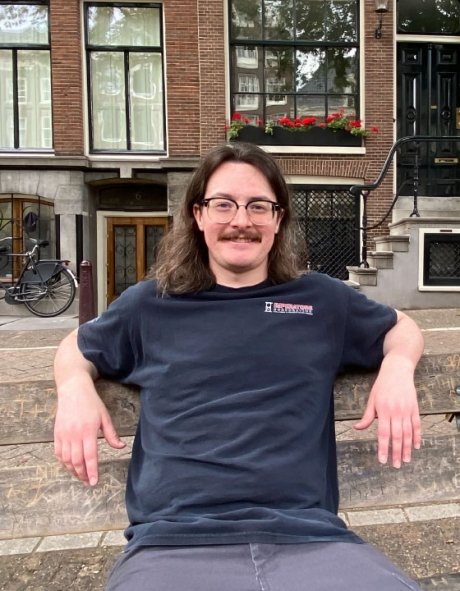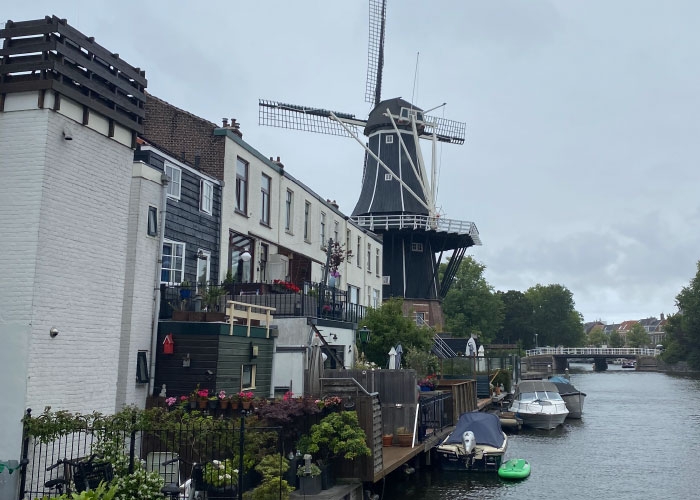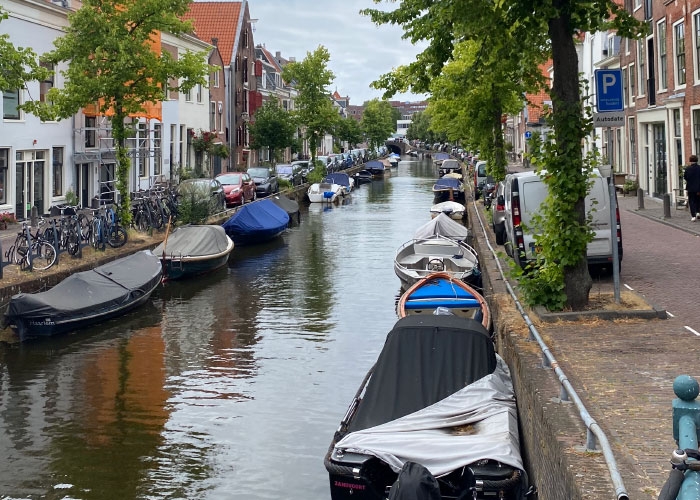
Let RIC student Callan Maytum tell you about the culture and cuisine of Amsterdam.
RIC senior Callan Maytum left the continent for the first time to study abroad for a month in Amsterdam.
“I chose Amsterdam because I always wanted to go to Europe as my first experience outside of the country, and the Amsterdam program, through CIEE, was one of the few programs I could afford,” says the 24-year-old.
CIEE is a nonprofit study abroad and intercultural exchange organization for American students. It offers over 400 programs in more than 40 locations around the world.
To help fund his trip, Maytum received a $1,500 David Thomas Family Scholarship from RIC’s Global Studies Program and a $2,500 World Connections Scholarship through RIC’s Office of Study Abroad. His plane took off in mid-June and he returned mid-July.
With a double major in history and anthropology, and a minor in global studies, the course Maytum took was an anthropology course titled “Dutch Culture and Cuisine” at the CIEE center in Amsterdam.
CIEE also arranged for his living accommodations and planned his cultural excursions. Each day he took in both the people and the food, which was, ethnically, quite varied.
Though Amsterdam is a major city in the Netherlands and home to many Dutch people, it also has a large and diverse population of many nationalities and ethnicities. Less than half of Amsterdam’s residents are ethnically Dutch, according to Study.com.
“Amsterdam is like the New York of the Netherlands,” Maytum says. The city has a significant population of immigrants, including those from Suriname, Morocco and Turkey. “So, in terms of food, there’s a lot of Chinese, Indian and Middle Eastern restaurants. The last two were the best food I had there,” he says.



As for the Dutch people, says Maytum, “The CIEE staff explained to us on the first day that the Dutch are very straight forward. Their form of respect is to be honest. So, if you ask them for help with something, they might tell you they don’t have the time. It was a bit of a cultural shock, but for them, it’s more rude to be dishonest.”
“They also have a cultural attitude of tolerance in terms of legislation that I found appealing,” he says.
One of the more well-known laws passed by the Dutch government in 1976 was the liberalization of the use of marijuana. It was a radical response to the social problems of drug abuse and has proved effective and popular with Dutch citizens.
“Their attitude there is very much ‘my business is my business.’ And the people respect that,” he says.
Here are a few other things you may not know about Amsterdam:
- “The Dutch invented Dutch-processed cocoa, which helps chocolate become solidified food. Before that, chocolate was only in the liquid form. The Dutch made it so that you can now eat a chocolate bar,” he says.
- “There are more bikes than people,” Maytum noted. “Every Dutch person learns to bike before they walk. The intersections are just incredibly hectic with bikes. And bikes have the right of way, so everyone has to stop for them. It may look like a traffic jam, but it all works pretty fluidly.”
- “Cars are almost entirely electric,” he says. “You can walk around in the middle of the day in the city and be able to hear birds chirping – you don’t have the noise of gas-run cars.”
- “I was surprised that even in the rougher areas of Amsterdam there were very few unhoused people. That’s because there’s a lot of social safety nets before people can get to that point. The country takes care of its people,” he says.
“Getting back to the U.S. was a little bittersweet,” Maytum admits. “I made close friends in the CIEE program within a short period of time. We shared this trip together, we ate together, we hung out together. It was odd to see everyone leave.”
But he does intend to return: “I fell in love with the country.”
Learn more about study abroad at RIC’s Office of Study Abroad.
